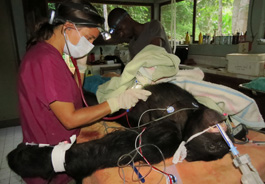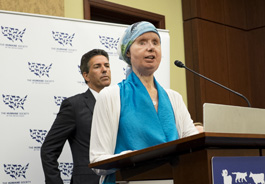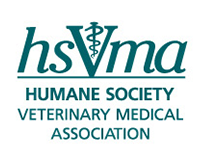A Veterinary Perspective on Captive Primate Welfare (Part 2)Legislative Remedies: The Captive Primate Safety ActTurning from the judiciary to the legislative front, Congress may also be debating primate protection soon, in the form of the Captive Primate Safety Act (CPSA). Introduced into Congress several times since 2005, the bill has yet to pass both houses in the same legislative session. Approved by a Senate committee last year, it will likely be reintroduced again soon. CPSA would, through an amendment to the Lacey Act, make it illegal for a private individual to “import, export, transport, sell, receive, acquire, or purchase [primates] in interstate or foreign commerce.” While this legislation would not affect zoos, research facilities, or other federally licensed entities, it would decrease the number of primates sold as pets via the Internet, private dealers, and auctions. Captive Primates are Inappropriate Companion Animals Dr. Reyes-Illg providing medical care to chimpanzees at the Sanaga-yong Chimpanzee Rescue Center in Cameroon. Dr. Gwendy Reyes-Illg Currently, the trade in primates is largely unregulated, with an estimated 15,000 primates in private hands. Working with sanctuaries, I have met several of these individuals after their “owners” surrendered them. At the Center for Great Apes, I met Linus, a 16-year old orangutan. When Linus arrived, he could have been a poster-child for why primates should not be pets. Purchased as an infant, he soon became too large and strong to be carried around. His “owners” simply put him in their basement, adding another tiny cage to the two that housed their other apes. After living like this for over a decade, Linus’s muscles were so atrophied, he could not move without trembling. His hair was matted with pounds of feces. He was finally surrendered to the sanctuary only when he had begun disassembling his cage from the inside and an escape seemed imminent. Jungle Friends, a monkey sanctuary, cares primarily for monkeys whose background is that of “child surrogate” and “pet.” Often, monkeys wind up in sanctuaries after they incur health problems, such as diabetes, caused by inappropriate diet and poor living conditions. Primates’ long lifespans, typically 30 to 55 years depending on the species, tend to be longer than those purchasing them can commit to them. The less fortunate are simply abandoned or euthanized. Monkey dealers frequently boast their specialization in “human-socialized” monkeys. This virtually guarantees that the dealer removes newborns from their mothers at birth, denying them the essential period of constant contact so key to their psychological development. Ignoring the dual needs for maternal bonding and large areas in which to exercise, online monkey dealers assure potential buyers that infant monkeys can be conveniently kept in wire cages as long as they are provided routine feedings. Public Health and Safety Concerns of Primate Pets Charla Nash spoke to the media and members of Congress on Capitol Hill about the Captive Primate Safety Act in July 2014. Pete Marovich for The HSUS The Senate committee that passed CPSA reported that its support was based not only on considerations of primate welfare, but also arose out of concerns for public health and safety. Because we are so closely related to primates evolutionarily, more infectious diseases can be transmitted to us from primates than from other species. Some may cause few symptoms in primates, but are serious or fatal in humans. The risk of injury from a “pet” primate is also high. This was graphically illustrated by the severe mauling of Charla Nash. When she was attacked by Travis, her boss’s 200-pound chimpanzee, Nash’s hands and face were literally ripped off and she contracted an ocular infection which left her blind. Nash now advocates for CPSA, writing about “the lonely, unnatural life that Travis and other primates kept as pets are forced to endure.” She blames primates’ propensity to cause human injury on the deprivation and unnatural conditions they are forced to endure. Primate Conservation Includes Halting the Trafficking PipelineCPSA may positively impact conservation efforts. The illegal international wildlife trade is estimated at $10 billion annually. Creative but tragic primate trafficking operations frequently make the news. While importing “pet” primates into the U.S. from abroad is already banned, the Act may protect wild primates in other countries by countering the increased international demand that is generated by news stories about American celebrities’ primate “pets.” The main opponents of CPSA are groups representing industries that profit from animal use. Some have questioned the need for CPSA, arguing that the problem is not big enough to warrant federal legislation. They point out that roughly half of states already prohibit private possession of primates and question using federal resources to enforce a ban on interstate trade. However, a quick Google search is enough to prove the need for this legislation. Topping the search results is a monkey dealer who boasts: “YES WE DO SHIP ANYWHERE IN THE UNITED STATES.” Their website directs visitors to a YouTube video proclaiming that monkeys “make excellent, excellent pets.” Given the vastly divergent state laws, federal restriction on interstate shipment is essential to combatting the primate pet trade. Concerns about the cost of enforcement similarly lack substance. According to the Congressional Budget Office, “implementing the bill would have no significant effect on the federal budget,” as the Lacey Act is already enforced. Furthermore, the criminal and civil fines collected from violators would help fund CPSA’s enforcement. |
